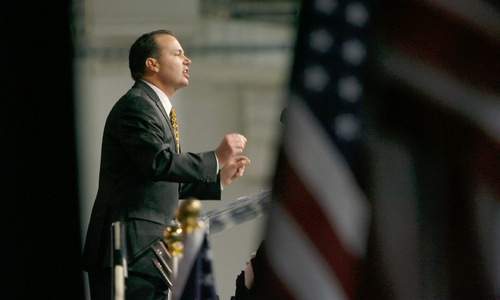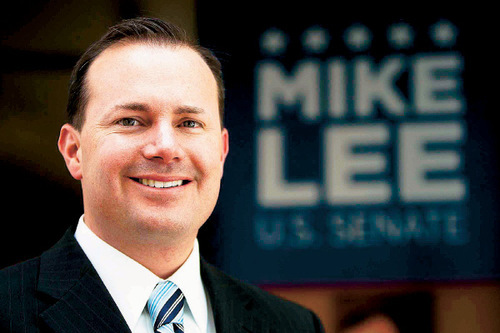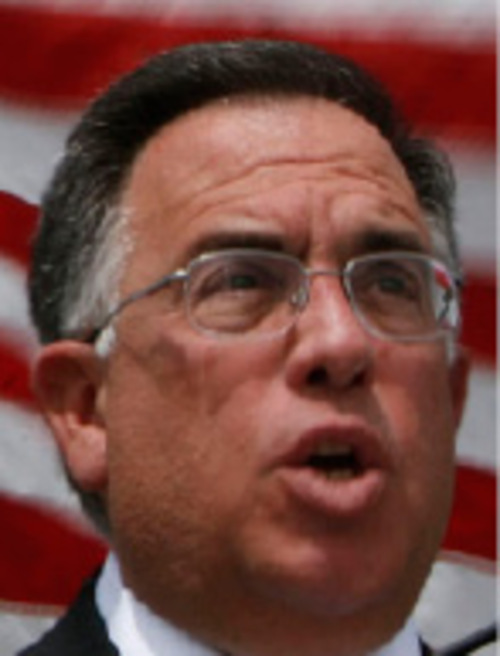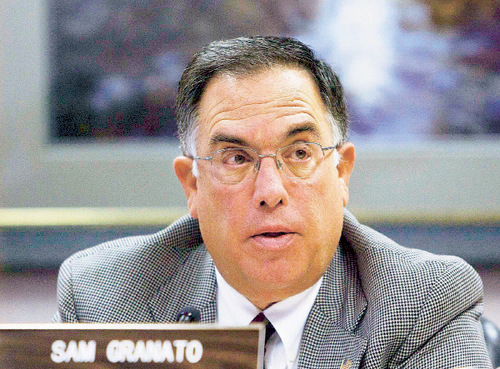This is an archived article that was published on sltrib.com in 2010, and information in the article may be outdated. It is provided only for personal research purposes and may not be reprinted.
Washington • Employing the Democrats' now standard strategy against tea party favorites, Utah's Sam Granato argues that Republican Mike Lee is "too extreme" to become the next senator for even one of the most conservative states in the nation.
In an election year when little is going their way, Democrats have hit on the catchphrase they hope will give voters pause and make them ask the question: Are these the people we want leading the country?
No one has used this as aggressively as Senate Majority Leader Harry Reid, who finds himself in a tight race with Sharron Angle in Nevada. He has hammered Angle as "just too extreme" for her comments on abortion, Social Security and a veiled threat for armed revolution. The ads seem to have had an impact, and Angle pronounced last week that she would be "a mainstream senator."
The Democratic National Committee has produced a three-minute Web video that tries to paint Republicans in Colorado, Alaska, Kentucky, Florida, Wisconsin and Connecticut in a similar fashion. Many of these candidates defeated rivals backed by the Republican establishment in primary fights.
Granato insists he isn't taking a page from the national playbook, but responding to what he hears on the campaign trail.
"People are saying to me: 'This man is extreme, he scares me,' " said Granato, a restaurateur and importer. "I'm mainstream. I'm the moderate in this race. He is more polarized and more different than I would ever think to be."
Granato first called Lee extreme in interviews shortly after Lee became his party's nominee in June, and Granato hasn't let up since. He recently produced a Web ad in which he says: "The mainstream is losing to the extreme."
And his campaign sent out a news release criticizing Lee's proposal to dismantle Social Security and allow states to create their own safety nets, as a way to reform the financially troubled program.
"Utahns can't afford Mike Lee's irresponsible and extreme approach to this very serious problem," Granato said.
Lee, a lawyer, said voters won't buy the "too extreme" argument.
"You have to do more than throw out disparaging labels to win an election," he said.
Lee said what's outside the mainstream is not the tea party and its candidates, but the bloated national debt, unemployment rate and tax burden.
"If someone is looking for what is extreme, it is preserving the status quo," he said.
That's indicative of the Republicans' general counter-argument, which is to tie Democrats to the current Congress and its policies. If possible, Republicans attempt to label their opponents as Washington insiders, which is happening with Reid in Nevada and Russ Feingold in Wisconsin.
That line of attack helped Lee defeat three-term incumbent Sen. Bob Bennett in Utah's Republican convention earlier this year. Since winning the primary election, Lee has held a major advantage in every poll and many national pundits say he is a shoo-in to win the November election.
But Granato says all of that prognostication is premature, because most voters have yet to focus on the race, which should start in earnest now that Labor Day, the unofficial start of the campaign season, has passed. When voters take a look at the candidates, Granato believes they will see a Republican out of step with their beliefs on issues ranging from Social Security to immigration to federal spending.
He even has Bennett's son, Jim Bennett, working on his campaign and leading the "Republicans for Granato" effort.
"Mike Lee, as you know, is the tea party candidate, and Utahns are not tea party people," Granato said. "I guarantee that my message is going to be accepted by more people than his."
Thomas Holbrook, a political scientist at the University of Wisconsin-Milwaukee and an expert in political communication, said it isn't a bad strategy to target unconventional candidates as outside the mainstream. And when the polls or voter demographics are working against you, as in Granato's case, there are few serious alternatives.
"It is trying to create some ideological space between the voter and the opposing candidate," he said. The assertion is: "They are way over there, I'm closer to you."
Holbrook said, in recent years, Republicans have been more likely to paint Democrats as too liberal to be elected, rather than Democrats questioning whether Republicans have veered too far right.
But what often happens is that both candidates moderate the partisan message for the general election and, in many cases, that decreases the effectiveness of a "too extreme" strategy.
That may not happen this year, because tea party candidates are riding the wave of a populist movement that doesn't take well to political expediency or flexibility. Holbrook expects candidates such as Lee and Angle to stand firm, which leaves them open to this type of criticism.
Lee said he won't change the direction of his campaign.
"My message is going to be consistent with what it has been all along," Lee said. "Our federal government is too big and too expensive. I should say extremely big and expensive."
Too extreme?
Here are a few issues on which Democrat Sam Granato says Republican Mike Lee is outside the mainstream.
Immigration
Lee says there should be no path to citizenship to those who are here illegally, and he wants to change the Constitution so that the children of undocumented immigrants don't automatically receive citizenship.
Granato sides with the strategy of President Barack Obama and former President George W. Bush. He believes a pathway to citizenship should be established that allows undocumented immigrants to pay a fine. He rejects any change to what he calls the "birthright" to citizenship.
Social Security
Lee believes Congress has failed in managing the nation's retirement system. He thinks, in the short term, the retirement age should be raised for everyone except those now receiving benefits. In the long term, he thinks it makes sense to dismantle the federal program and allow states to run their own.
Granato says Social Security should remain a federal program and he has concerns about raising the retirement age to help the program become fiscally solvent.
Federal spending
Lee believes the federal government is spending way too much in areas that go far beyond the federal government's purview. He has also vowed not to ask for any earmark for a year and questions why federal money is subsidizing the construction of local transit projects.
Granato said he would ask for "appropriate" earmarks and would seek federal money in various areas, including university research and transit.









